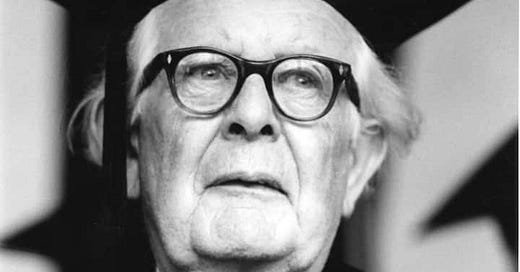Jean Piaget on Donald Trump
Forget economic theory. To understand Trump's tariff reversal, you need to know about transductive reasoning
Jean Piaget, 1968.
First there is a tariff, then there is no tariff, then there is. Donald Trump said last week that there was nothing that Canada or Mexico could do to deter him from imposing 25 percent tariffs on their imports. Then, on Monday, Canada and Mexico made a couple of itty-bitty concessions—just enough to allow Trump to claim victory—and Trump delayed the tariffs for one month. It’s impossible to know what will happen in one month.
The real reason Trump delayed the Canada and Mexico tariffs was that the stock market fell one thousand points. Everybody told Trump this would happen. He didn’t believe it. Or maybe it just wasn’t real to him until it happened. In my latest New Republic piece, I borrow from the child-development work of the Swiss psychologist Jean Piaget (1896-1980) the concept of “transductive reasoning,” which describes the faulty way that children reason from about age 2 to 7. In his 1926 book The Child’s Conception of the World, Piaget wrote:
If the child sees everything from his own point of view, it is because he believes all the world to think like himself; he has not yet discovered the multiplicity of possible perspectives and remains blind to all but his own as if there were only one possible. Also he states his views without proof since he feels no need to convince. The results of this are seen … in transductive reasoning [italics mine], which … leads from one particular to another, heedless both of logical necessity and of general laws.
Transductive reasoning misconstrues cause and effect. For example, one psychology textbook explains, a young child might think that a swaying tree branch is what caused the wind to blow rather than the other way around. Or (to cite another source) a child who hears a dog bark and then hears a balloon pop might conclude that the dog’s bark caused the balloon to pop.
It’s really cute when you’re 5! It isn’t so cute when you’re 78 and president of the United States. You can read my piece here.





I love that you addressed this and broke it down, because years ago I realized that the best way to make any sense of Trump's behavior is to imagine him being a toddler. In this framework, he makes perfect sense. He's like a toddler at preschool at costume time, pretending to be president.
Finally! I’ve been trying to figure out how his alleged brain works. I knew he had the vocabulary of a young child and I assumed that meant he was mentally slow, but I’m not that familiar with Piaget’s work to peg it so accurately. Thank you.